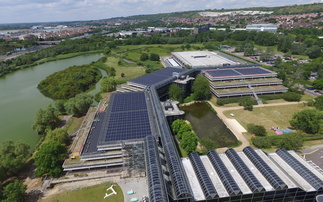But DECC insiders suggest ambition will actually increase, despite planning to close support for solar farms next year
The government has been accused of "deliberately setting out to strangle the growth of cheap solar power", after today revealing plans to end Renewables Obligation (RO) subsidies for solar farm projects from 2015.
Despite Energy Minister Michael Fallon in March denying any plans to change subsidies for solar power before 2017, the Department of Energy and Climate Change (DECC) today unveiled a review of support levels that proposes an earlier than expected end to solar farms accessing the RO scheme.
What changed between March remains a source of contention between the industry and the government, but the coalition today said it was concerned the growing number of solar farms popping up around the UK was putting pressure on DECC's clean energy budget, known as the Levy Control Framework. Ministers have voiced fears the surge in new solar farm projects could eat into a budget that was mainly intended for rooftop schemes and could potentially turn the tide of public support against solar.
While the proposed changes may look like a blow to the industry, government sources told BusinessGreen ministers were hoping the reforms would boost overall ambition for the sector, by spreading subsidy payments between more solar projects. They said the changes could be cost neutral, and that it was still working towards an aspirational goal of deploying 10-12GW of capacity through solar farms by 2020, up from 2.7GW today.
Solar farms might lose the RO next year, but projects will still be eligible for support through the new Contract for Difference (CfD) mechanism, which guarantees energy prices for clean energy generators.
DECC officials have been at pains to highlight how the Solar Trade Association (STA) welcomed higher than expected strike prices through CfDs six months ago, taking this as evidence that the cuts will not damage investment in the sector. The consultation also promises "grace period" arrangements for solar farms that are already in the pipeline that may allow a handful of projects to still access the RO after April 2015, as long as they can demonstrate that plans were under way ahead of today's announcement.
Moreover, the government is seeking to accelerate the development of large-scale solar rooftops by slowing the rate of planned subsidy cuts for such projects. Ministers are proposing splitting the feed-in tariff band for installations with over 50kW of capacity into two categories: ground-mounted projects that feed energy directly into the grid and rooftop- or building-mounted schemes that you might find on warehouses or factories. Under the proposals, building-mounted projects would benefit from a slower rate of degression in the future, resulting in higher levels of support than previously planned.
But will the new proposals be enough to boost the under-deployed market for mid-scale solar, and where do the changes leave the currently fast-expanding solar farm market?
The solar industry's initial reaction is that it is facing a major blow to its medium- and long-term prospects. Leonie Greene of the STA expressed widespread fears that the review would put the brakes on the deployment of solar farms from next year, arguing that the move from the RO to CfDs will not be welcomed by many developers. She also argued that the changes to the subsidy regime for solar rooftops does not constitute an increase in support and as such is unlikely to provide much in the way of new momentum for the market.
Greene admitted the industry did celebrate the relatively generous CfD strike prices that were proposed in December, but that was only when the sector thought solar farms that applied for support would definitely secure payments. Since then the government has said it wants solar schemes to compete with onshore wind farms for contracts - plans that it confirmed today. As wind is currently the cheapest form of clean energy technology and the government has refused to set aside a minimum budget for solar, solar developers are concerned that they may struggle to win contracts through the proposed CfD auctions.
Greene said the industry had expected solar to reach a position where it could compete with wind farms on strike prices in 2018, but these new cuts could flatten the cost reduction curve. "DECC has totally changed the policy framework since we did that analysis," she told BusinessGreen. "We were expecting administered CfDs, therefore total confidence that if you put money into a project, you would build it. They have completely changed that with auctioning; the risk has shot up for SMEs. It means you could sink all that money into delivering a project and then not win your auction."
Greene also warned that if the solar industry is now unable to deliver the steep cost reductions that had been projected it would curb the competitive pressure on other clean energy sources to lower their costs. "They're shooting themselves in the foot," said Greene of the government. "If these proposals go through, they're massively tripping up the industry and what has been a very successful rate of cost reduction and they're in danger of actually slowing our ability to deliver lower cost solar."
She accused the government of seeking to "dictate the energy mix", contrary to claims from ministers that they are pursuing a broadly technology neutral strategy. She also warned that some solar developers would now be reconsidering their long term investment plans.
Juliet Davenport, founder and chief executive of Good Energy, confirmed that Greene's prediction was well founded. "This decision will bring further instability and uncertainty to investors, and we will have to reconsider our portfolio of investments as a result," she said. "Solar offers the opportunity for diversifying investment away from the traditional big six, bringing with it the potential for job creation and further investment."
Seb Berry, head of public affair for developer Solarcentury, agreed the proposals were at odds with government plans to slash energy costs and accused the government of "deliberately setting out to strangle the growth of cheaper solar from 2015".
"This policy proposal will undermine investor confidence in the entire UK renewable energy sector, by removing at a stroke the short- and medium-term policy certainty required for major project investments," he said. "It is very surprising that such a deeply damaging policy has been cleared by the Treasury."
He also hit out at the government for keeping the industry in the dark over the planned proposals, and failing to discuss the plans with the industry's top level solar strategy group. "The reality is that large-scale solar PV in the UK is one of, if not the only major success stories of coalition green energy policy since 2010, but now the outlook beyond the end of this financial year is extremely uncertain," he said.
While ministers try to remain upbeat about the changes, and the industry fears a dire impact, the rest of us will have to wait for the government's impact assessment to find out if the review really will cut the industry off at its knees, or free it up for a new phase of development.










